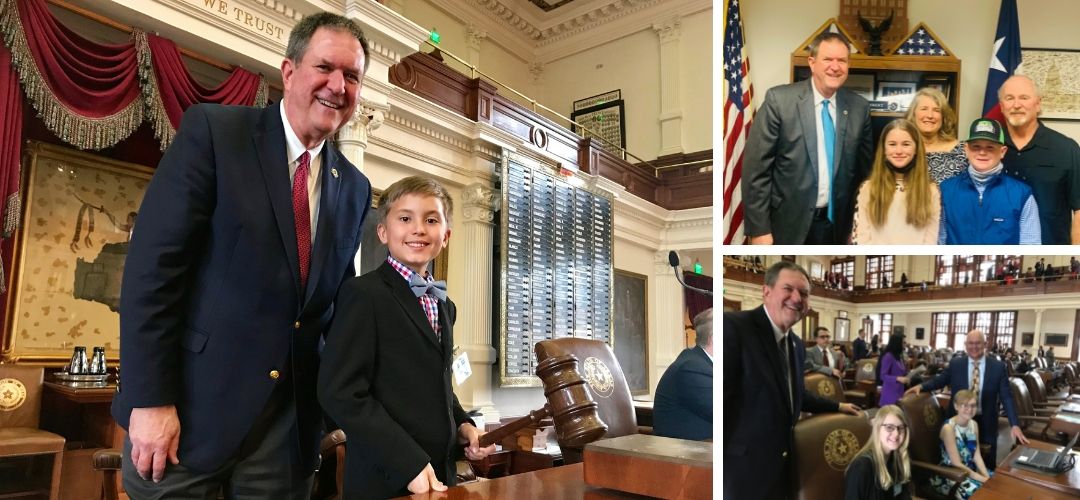Stan Lambert is a child of Abilene and an alumnus of the Abilene Independent School District having attended Taylor Elementary and Lincoln Junior High before graduating from Abilene High in 1971. He went on to graduate from Abilene Christian University with a degree in business before getting his master’s in banking from SMU.
Lambert has had a varied background, living and working in Ennis where he served as mayor for two years (1990-91) before moving back to Abilene to work at ACU. He later became the school’s director of athletics before becoming Executive Vice President of Coleman County State Bank.
He first ran for public office in Abilene in 2006 and won a seat on the AISD Board of Trustees that had been vacated when Susan King was elected to the Texas House of Representatives. Lambert served on the board for 10 years – presiding over the board as president for six of those years – before once again following King, who had resigned from the House.
Lambert won his first seat in Austin in 2016, handily winning both the Republican primary and the general election. In four general elections for the District 71 seat in the Texas House of Representatives, Lambert has never received less than 78.1 percent of the vote, including last month when he beat Democratic challenger Linda Goolsbee with 81 percent of the vote to her 19 percent.
With the Texas Legislature set to go into its 88th session on January 10, Lambert sat down for a question-and-answer session about some of the main topics that will be on the minds of legislators in Austin.
Q: Tell me first about growing up in Abilene and attending Abilene ISD schools and your memories of those years.
Lambert: Looking back, it was probably one of the best experiences I’ve ever had in my life because of the teachers and coaches who took an interest in me and gave me that foundation that I’ve tried to build upon over the years. I had a lot of opportunities to serve in leadership positions. All my high school friends laugh and say that there’s not a ballot Stan Lambert didn’t put his name on. They’ve been voting for me for a long time, and I tell them how much I appreciate that because I need their votes. It’s been fun to try to give back in ways that a lot of people talk about: serving on the school board for several years and having this opportunity to represent the district in Austin has been a blessing in a lot of different ways. I give a lot of credit to those people like Peggy Brennan at Taylor Elementary School, Dub Pierce at Lincoln Junior High, and Blackie Blackburn and Bev Ball at Abilene High School who took an interest in me and helped groom me in ways that I’ll never be able to repay.
Q: What did you learn in your 10 years as an Abilene ISD trustee that has served you in your capacity now?
Lambert: I learned that I don’t really know much about education, and even after 10 years on the school board and now three legislative sessions I’m still learning so much about what goes into the entire education process and understanding not just how school districts operate and the nuances that occur. Many of us had the great experience of going through public education for 12 years, but it’s different when you look at it from the perspective of a school board member knowing you don’t have a lot of decisions to make. Between the federal government and state government, what gets passed down to the local school board are a very limited number of decisions because of all the mandates and programs, and well-defined services. Over 10 years you realized you’re there to make sure you have the right people in place to do their jobs, and then you try to stay as far away from them as possible and let them do their jobs.
Q: What intrigued you about running for state representative in 2017 when Susan King decided not to run again?
Lambert: Taking the experience I had to the next level and knowing just how important education is to the state of Texas in terms of our long-term success was the biggest factor. We must ensure that we have the next generation ready to step up, whether it’s in the business community, education, or the non-profit sector. No matter where those young people are going to be building their careers, we have a tremendous obligation to make sure that when they cross that stage and are handed their diploma that they are as prepared as they possibly can be. I think overall we’re doing a pretty good job in the state of Texas in making sure that happens. Can we improve? Absolutely. But that’s what initiated my interest in wanting to continue to serve, but maybe at another level.
Q: In looking back at your electoral history, you’ve never received less than 78.1 percent of the vote in any of your legislative elections. To what do you attribute that success?
Lambert: I have a great staff; I’m very blessed to have people working around me who are good at their jobs. I also think it goes back to the fact that I grew up here, spent 12 years here in public education, and then four years at Abilene Christian University getting my degree in business and finance. I’ve been around for a long time and hopefully haven’t made too many people mad or upset at me, although I’m sure there have been enough reasons for that to have happened. It is a heavily conservative base and if you go to Austin and do what you said you were going to do, I believe people will respond in a way that says, ‘We trust you to continue to deliver.’ I said at the beginning I wanted to continue to keep our economic growth moving forward in Texas because that provides so many more opportunities in terms of funding education, funding health care, and growth in terms of roads and transportation. And I also wanted to invest more in public education, and I think we’ve done that to a certain degree. We still have room to improve, but for the most part, I think I’ve answered what I said I wanted to do when I first went to Austin six years ago.
Q: Funding for education and COVID were the two largest priorities in the 87th legislative session in 2021; I’m assuming that funding for education will continue to be at the forefront of what you’ll be pushing for when the 88th session begins in January?
Lambert: Absolutely. I was on the school board in 2010 and 2011 when the state economy wasn’t doing so well, and we had to $5 billion out of public education, and I was on the board making those tough decisions on how many full-time employees were we going to cut to make sure we had a balanced budget. I think the number ended up being around 125 or 130, although most of that was through attrition – people resigning or retiring – as it is most of the time. We had to make some tough decisions about library services, nurses’ aides, and consolidating some positions, but those were hard decisions to make because students still needed those services and we had to do what we could with the limited resources we had on hand. So, coming from that and then going into 2019 when we added about $5.5 billion, we just kind of caught up where we were before the cut.
Q: What are the top priorities for this 88th legislative session?
Lambert: I hope we make a significant investment in education this session because I believe the most important thing we’re going to be doing is funding. It’s coming up with a budget that represents the best of what Texas can offer in terms of education and health care and roads and transportation. It’s very unusual to have a $27 billion surplus to start with. Most of the time we’ve started we’ve been looking at budget cuts instead of a surplus. This will be one of the hardest sessions we’ve ever had, but it’s a good problem to have. We have 150 different House members, and each one of us has a different idea of what those priorities should be: Is it education? Is it infrastructure (broadband)? Is it mental health? What are the four or five most important priorities? Coming to a consensus on that will likely be a struggle.
Q: Learning loss among students is still at the forefront of the thoughts of every superintendent in Texas. How does that figure into this legislative session?
Lambert: That will be an extremely important discussion. I remember reading an article just a year ago that said this is a four or five-year process, not just a one-year recovery. That means we must continue to focus on learning loss. It bothers me that the kids who were sophomores and juniors in high school when the pandemic hit will never catch up on those last two years of high school. Hopefully, the ones who were in 7th and 8th grade (in 2020) can get caught up to a commensurate level of education where they feel comfortable with the foundation they’ve been provided.
Q: Teacher shortage is also at the top of everyone’s thought process that’s involved in the school business. Where are you on that in this session?
Lambert: I think we can be very aggressive in trying to attract and retain teachers in terms of providing opportunities for encouraging young people who are in college who are still undecided about what their future might be. Some scholarships might be able to be created that would help incentivize them to get into education. As far as retaining our existing workforce, we need to make sure we invest some additional funding into salaries and benefits, so they understand that we recognize education as very, very important and that we start changing the vernacular regarding their careers. This is a professional career that requires training, education, and additional training as they move through their careers to give them the skill set to deal with things like discipline and other issues that come up in the classroom. We must figure out a way to alleviate the extra work that they’re having to perform and make sure they’re focusing on students and giving them the basic skills and knowledge they need to move forward.
Q: Standardized testing is still a hot topic of discussion in education circles across the state. Where do you see that evolving over the next decade?
Lambert: I think it’s going to be one of the most important things we decide to do in Texas because that’s why our state gets a bad rap in comparison to other parts of the country. Most people compare based on how much funding we’re giving per student. I think most districts get the negative perception when they get a low grade that they aren’t performing, yet we aren’t considering the demographics that challenge those districts. We need testing and we need assessments, but we need to come off the reliance on one test being one indicator of how a district is performing overall. We need different measurements and different ways of building in those different metrics. What works in Houston doesn’t work in West Texas, and we need to make sure that we don’t come together with the idea that we must figure out one statewide solution to this in terms of accountability and assessment. We must figure out a way to pass that down to a local level and allow our local administrators and school boards to figure out what’s best for the students in Abilene ISD or what’s best for Wylie ISD, or Jim Ned ISD. The state can provide general guidelines or a roadmap to a certain degree, but let the details be worked out at a local level.
Q: The issue of safety and security on campuses is on everybody’s after the shooting last May in Uvalde, and I’m sure it’s no different among legislators. We’ve had these before in Texas, but this one seemed to be a tipping point in this discussion. Can you give me your thoughts on that, and what the legislature will be looking at this session regarding safety and security?
Lambert: That’s going to be at the center of additional funding. We’ve already moved some money in the interim to help school districts address the ‘hardening’ of campuses, but we’re not through. We need to continue to provide additional funding for us to keep moving in that direction. Nobody wants our campuses to be like prisons, but we need to make sure that there’s no excuse for a campus to not be ‘hardened’ and to make sure those teachers and students feel safe. We need to make it so that it would take a tremendous effort on someone’s part to gain entry onto campus when they shouldn’t be there.
Q: From a state legislator’s perspective, what was it about Uvalde that set all of this off? Even though Texas has had mass shootings on campuses before, this one seems different. Do you have any theories as to why that might be the case?
Lambert: The fact that there was law enforcement in the building while the shooter was active just sends chills through my bones about what we’ve got to do to make sure that we have the training, communication, who’s in charge, which law enforcement agency takes precedence, etc. We’re going to see some recommendations from the Lt. Governor and the Speaker of the House, so I believe that, to a large degree, whatever recommendations come out of committees will be enacted upon and the resources will be available to make sure those recommendations are implemented. We want to make sure that we have done everything that we can to ensure that those mass shootings don’t occur. Now, are we going to stop shootings? I don’t think we can because I don’t think we can predict the evil that’s going to occur in our world. But we need to keep pouring resources into mental health resources and services and make sure we have enough beds in the state to accommodate those young people who are experiencing loneliness, isolation, depression, or whatever causes them to reach that point in their life that they believe the next step is for them to harm others. We’ve got to come to a consensus about the best way to solve that problem. I don’t know that we’ll ever solve it, but we need to keep investing in that area.












